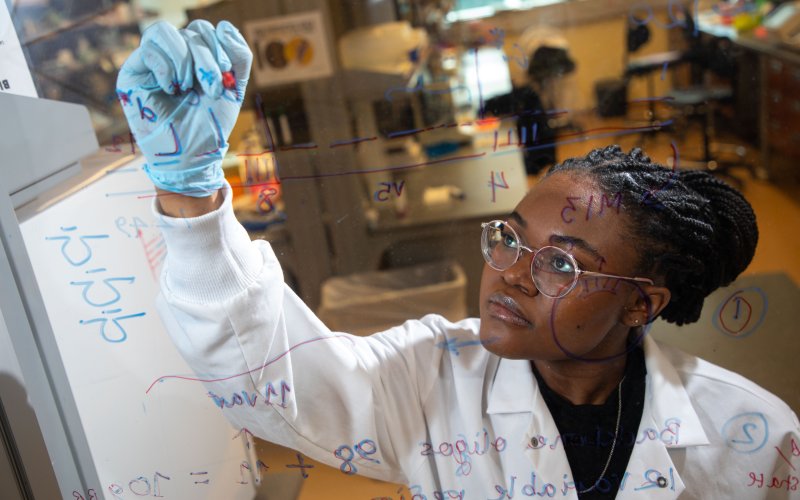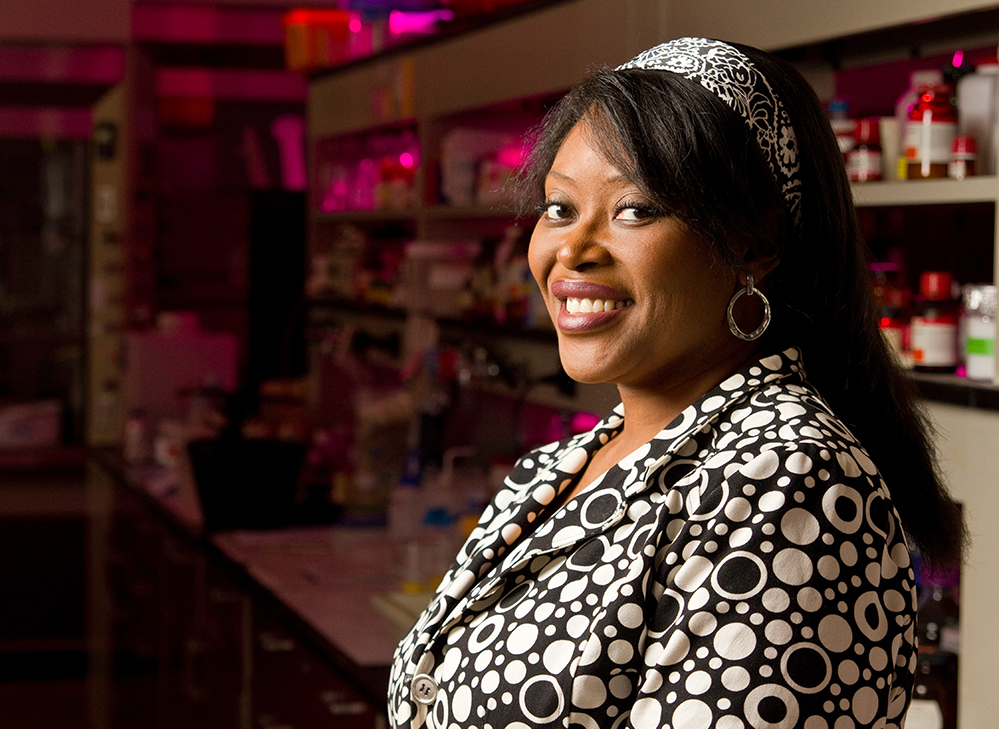UAlbany Awarded $2.5M Grant to Pioneer STEM Success Programs

ALBANY, N.Y. (Nov. 2, 2022) — The University at Albany has been awarded $2.5 million from the Howard Hughes Medical Institute to pioneer new, more inclusive approaches to teaching STEM disciplines and mobilize a comprehensive student support network to increase retention and graduation.
The program, EXCELlence in STEM, is based on an existing STEM support network at UAlbany shown to benefit STEM majors who participate, with a greater proportion of positive impacts on STEM majors from historically underrepresented backgrounds. The University believes it will show similar results on a larger scale.
The five-year grant comes through HHMI’s Driving Change initiative, which seeks to seed culture changes at research universities that help ensure students from all backgrounds, particularly those from historically excluded groups, will be well-prepared for leadership roles in science, technology, engineering, and math fields.
UAlbany is one of the most diverse public research institutions in the nation. About 40 percent of UAlbany undergraduates identify with historically underrepresented groups, by far the highest percentage among SUNY’s four R1 University Centers.
“This prestigious grant from HHMI is a powerful validation of UAlbany’s work to ensure both that our student body reflects New York’s rich diversity and that every student has the resources and support to succeed,” said University at Albany President Havidán Rodríguez. “In order to continue to lead in the tech economy, our country and our state need to diversify their STEM workforces. UAlbany is committed to leading the way with innovative, data-driven practices that will help ensure equitable access to these life-changing careers.”
A more inclusive learning environment
"Instead of a 'fix the student' mindset," HHMI said in its announcement naming the first six Driving Change awardees, "Driving Change works with universities to create a more inclusive STEM learning environment for all students."
UAlbany’s multi-pronged approach will build on the University’s existing robust student support infrastructure to offer intensive supplemental instruction, a summer assessment program with online preparatory courses and dedicated Student Success Teams for all incoming STEM majors, as well as strategic microgrants, high-impact summer research opportunities and personalized advising and counseling.

investigator on the HHMI Driving Change grant.
EXCELlence in STEM will also incentivize faculty to structure their syllabi and their approaches to teaching in ways that are more inclusive of all learners. Working closely with STEM faculty and the Institute for Teaching, Learning, and Academic Leadership, the University will develop a robust model to provide opportunities for all STEM faculty to engage in collaborative design, testing, and implementation of inclusive pedagogy materials. The University will match the grant funding with nearly $2 million in new funding and $2.3 million in dedicated space and administrative support. It also will conduct scholarly research on the program and its results to inform best practices for use on other campuses.
The program will be implemented across UAlbany’s STEM majors, where the representation of historically underrepresented students currently lags that of the undergraduate student body as a whole. Chemistry Professor Rabi Musah, who is affiliated with The RNA Institute, is the principal investigator on the grant, which was advanced by Provost Carol Kim and supported by the Office of Academic Innovation and Student Success and the Division of Advancement's Office of Corporate and Foundation Relations.
“Student success is at the heart of everything we do at UAlbany,” said Provost Kim. “Thanks to the Howard Hughes Medical Institute, this funding is an important opportunity for UAlbany to scale some of its most innovative and impactful practices to benefit all STEM majors and to fulfill our parallel commitments as a public institution to both student achievement and equity. I am grateful for the hard work of Professor Musah and the entire team that has, and will, contribute to making this ambitious vision a reality.”
Building on existing STEM success programs
A central pillar of the EXCELlence in STEM program will be replicating and scaling the success of UAlbany’s existing Center of Achievement, Retention and Student Success (CARSS) for all incoming STEM majors. CARSS began in 2008 with a National Science Foundation grant and provides free, highly structured tutoring in lower division undergraduate biology, chemistry and physics courses that reinforces core study skills and emphasizes learning science by empowering students to relate key concepts to their own relevant prior knowledge and cultural context. UAlbany students who currently use CARSS persist and graduate at significantly higher rates across all demographics but especially among students from underrepresented backgrounds.
EXCELlence in STEM will expand the CARSS model to all incoming STEM majors, providing similar supplemental instruction from diverse graduate student fellows specially trained for the roles. Each STEM major will also be assigned a Student Success Team from UAlbany’s Office of Academic Innovation and Student Success, including tutors, academic advisors and financial aid counselors, with real-time monitoring that will allow rapid intervention at the earliest signs of academic distress. The University is also establishing a diverse group of STEM-specific advisors who will be trained to assist students across a broad range of areas.
“We are thrilled that all of our STEM majors will be able to avail themselves of the opportunity to excel,” said Professor Musah. “UAlbany has made great strides in devising a holistic approach to STEM persistence and retention, and it’s wonderful that with the support of HHMI, we can scale our programs to include everyone.”
The University has also created a microgrant program to ensure that relatively modest financial hurdles do not derail students who are otherwise making good progress toward degree completion. These grants will be made available on top of financial support for high-impact summer research programs that will pair students with research mentors and expose them to the opportunities available in graduate study and beyond. The Driving Change grant comes on top of numerous other efforts at the University to both diversify its STEM majors and the faculty members teaching them.
A University-wide effort to diversify STEM
This summer UAlbany was selected to lead a $2.5 million National Science Foundation grant for the Louis Stokes Alliance for Minority Participation (SUNY LSAMP) program aimed at increasing participation by underrepresented students in STEM disciplines. In 2022, UAlbany received a $1 million NSF Advance grant, called Project SAGES (Striving to Achieve Gender Equity in STEM) to increase the number of women and women of color in STEM fields.
Even beyond STEM, UAlbany has been recognized as a leader within SUNY and nationally for its commitment to the success of underrepresented students. In September, UAlbany became the first SUNY campus and the only R1institution in the northeast to receive the prestigious Seal of Excelencia for its proven, data-driven approach to Latina and Latino student success.
UAlbany also has been repeatedly recognized by The Education Trust as a national leader both in the representation and success of Black and Latino students on campus — and by numerous organizations, including U.S. News & World Report and the Washington, D.C. think tank Third Way, as a top performer in the social and economic mobility of its students.




